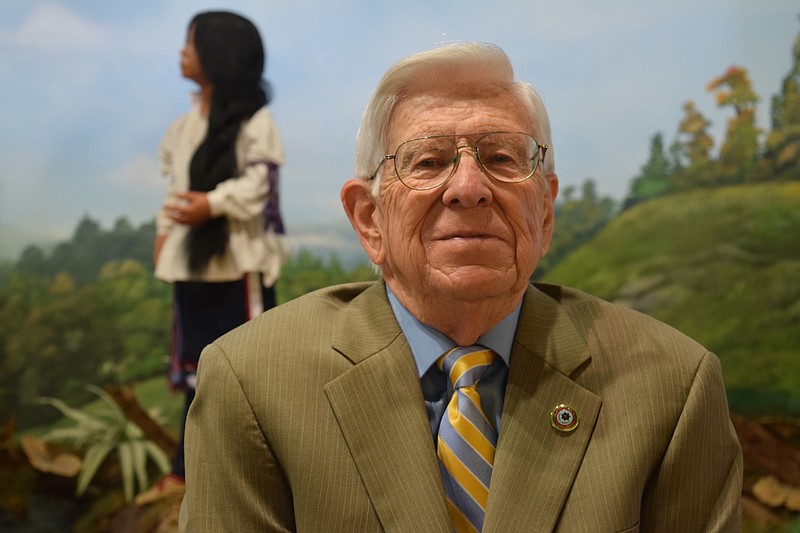A bill passed by the U.S. House last week seeking to return 76 acres of ancestral tribal land to the Eastern Band of Cherokee Indians has been referred to a Senate committee, making it more likely the measure will be routed toward the president's desk during the 115th Congress.
U.S. Rep. Chuck Fleischmann, R-Tenn., said the Eastern Band of Cherokee Historic Lands Reacquisition Act, introduced in 2015 and passed last Monday night in a 383-2 House vote, seeks to make good on a promise made when the lands in question in Monroe County were inundated after the construction of the Tellico Dam in 1979.
House Resolution 146
In detail, H.R. 146, the Eastern Band of Cherokee Historic Lands Reacquisition Act, will:› Impact approximately 76 acres of land along the Tellico Reservoir and Little Tennessee River in Monroe County, Tenn.;› Include lands from the Sequoyah Museum, the Chota Memorial, Tanasi Memorial and land to provide support for these properties and cultural programs;› Place impacted land into trust for the benefit of the Eastern Band of Cherokee IndiansSource: U.S. Rep. Chuck Fleischmann’s office
"Tonight, the House voted to keep a promise to the Eastern Band of Cherokee Indians by rightfully returning 76 acres of sacred land in Monroe County, putting the land back in tribal hands," Fleischmann told House members after the vote.
"We are looking for a champion to take this" through the Senate and said he hoped "we can actually put this on a fast track," Fleischmann said after the bill passed.
"What we don't want to have happen is to let it languish," Fleischmann said. If not passed by the Senate during this year's Congress, Fleischmann would have to reintroduce the bill in the next session, he said.
The day after the House passed the measure, senators received and twice read the act before referring it as HR 146 to the Senate Committee on Indian Affairs. A hearing date for the Senate's Committee on Indian Affairs has not been set, according to the Senate committee calendar.
"We expect that the bill will not face opposition from Tennessee or North Carolina senators, and hope the legislation will move through the Senate quickly," Fleischmann spokeswoman Kasey Lovett said Tuesday via email, referring to Tennessee Sens. Lamar Alexander and Bob Corker and North Carolina Sens. Richard Burr and Thom Tillis.
The House vote drew praise from Eastern Band Cherokee leadership in North Carolina, as well.
"We are one step closer to completing reacquisition of historical Cherokee lands in East Tennessee. These lands are culturally and historically important to all Cherokee people," Eastern Band of Cherokee Indians Principal Chief Richard G. Sneed said in a statement.
"The protection of Cherokee historic sites is critical to understanding our shared history," Sneed said. "Congressman Fleischmann and the people of East Tennessee have been remarkably hospitable to us, and we look forward to new investments in East Tennessee when the bill is enacted into law."
When the 129-foot-high dam was finished in 1979, 276 families were displaced by the 15,560-acre reservoir along 33 miles of the Little Tennessee River. TVA acquired 37,900 acres for the project. Some of the displaced families sold willingly, while others had to be forced out through condemnation of the land, according to TVA officials.
The dam inundated the land of historic tribal communities of the Overhill Cherokee like Chilhowee, Tallassee, Citico, Chota, Tanasi (from which Tennessee drew its name), Toqua, Tomotley, Tuskegee and Mialoquo.
Max Ramsey, who worked for TVA during planning and construction of the Tellico Dam and who now works with the tribe in future planning and other affairs, said Tuesday he's glad the act is now in the Senate and getting closer to a signing in the Oval Office.
"With only two votes against it, I don't think they'll have any particular problems in the Senate either, but who knows, you can't predict Washington these days," Ramsey said.
If the bill becomes law, the return of ancestral lands to the tribe will bolster other efforts already under way, Ramsey said. The Sequoyah Museum in Vonore, Tenn., is undergoing major renovations and updates, and Ramsey hopes other plans in the works for the area could make the Cherokee homeland a travel destination.
Fleischmann said that more than anything, the bill keeps a promise made long ago.
"This was very simple in its purpose, very simple in its scope," Fleischmann said. "This bill is very special and very personal to me.
"When the Eastern Band of Cherokee came to me and said we have had promises broken again to us and I researched this, they were absolutely right and even the promise breakers were very honest with me about the facts so the facts were never in dispute," he said. "There's no question that the 76 acres in Tanasi were promised to the Cherokee a long time ago and that promise was unfulfilled."
Fleischmann said there were some who believed the tribe wanted the land for a casino, "but nothing could be further from the truth, so we actually put anti-gaming provisions in the statute but this is, plain and simple, the return of Tanasi back to the Eastern Band without going through all that government bureaucratic red tape through the Bureau of Indian Affairs.
"It's the right thing to do," he said. "It's something that Republicans and Democrats can both embrace. As a civil rights bill, this is something I think all Americans can embrace and bring us forward in this healing process."
Daniel Tidwell, Fleischmann's legislative director and counsel, said there's a likelihood the measure could be passed in the Senate by the end of session in December. The bill, so far, has not drawn controversy, Tidwell noted.
Contact staff writer Ben Benton at bbenton@timesfreepress.com or 423-757-6569. Follow him on Twitter @BenBenton or at www.facebook.com/benbenton1.


